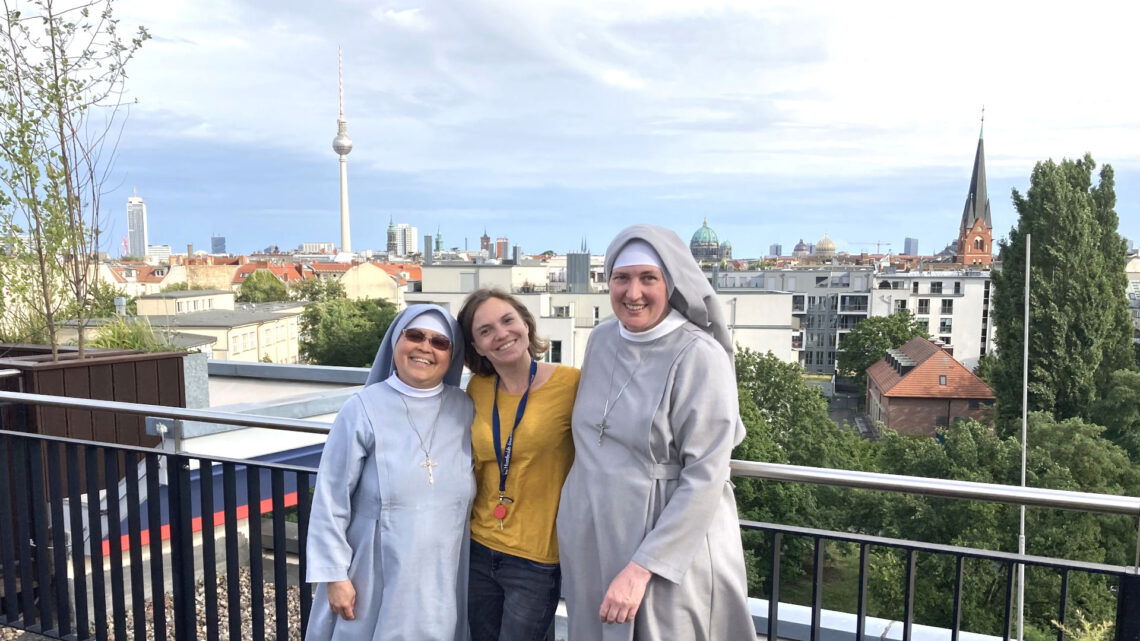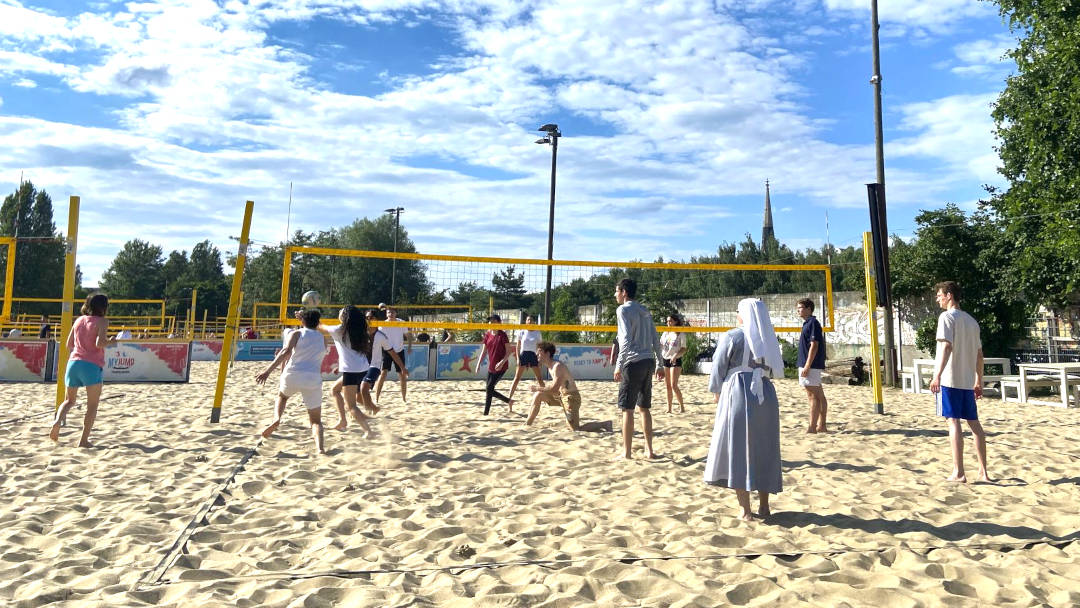Pink Sisters: Two Nuns and Their German Course in Berlin12. September 2023 by Humboldt-Institut

Our language school in Berlin hosted two very special students in July: Suzzette and Lorena. The two are nuns in the Holy Trinity Monastery in Bad Driburg in Western Germany and tell us here more about everyday life in the monastery, why they learn German and what they like so much about Berlin.
Hello Lorena, hello Suzzette, can you please first tell us a little bit about yourselves?
I am Suzzette, I am 57 years old, and I come from the Philippines. I joined the Order 35 years ago and have been living in Germany for eight years.
My name is Lorena, I am 47 years old. I originally come from Argentina, and I have been in the Order for 29 years, four of them here in Germany.
We have not yet had any nuns among our students. What does your order do, and what is daily life like there?
Suzzette: We are sisters of the order “Servants of the Holy Spirit of Perpetual Adoration”. One of our convents is located in Germany and there is also the leadership of the Congregation, which takes care of a total of 21 convents around the world. For our community, internationality is a defining element. In our monastery in Bad Driburg there are 30 sisters from seven nationalities: Argentina, Philippines, USA, Indonesia, Brazil, Austria, and Germany. What unites us is our diversity.
A special feature is our pink religious habit, which we wear only within the convent. That is why we are often called Pink Sisters or the Pink Sisters. The special color was the wish of our founder, St. Arnold Janssen. He wanted us to be a sign of joy when we pray.
Lorena: We spend a lot of time in the chapel. Seven times a day we meet for prayer, plus we pray individually. We pray for all the people, from early morning until late at night there is always a sister in the chapel for prayer. Three times a day we eat together. In addition, we take care of the housework, gardening, and we answer the phone e.g., calls from people who have spiritual questions or whose requests we should include in our prayers.
Why are you learning German and what are your goals for the course?
Suzzette: This is my last week in Berlin and I have been here for 7 weeks. Currently, I am in level B1, and I am going to write the telc B1 exam. My teacher has given me extra books and tips. With the lessons I have had so far, and everything I have learned so far, I should be able to do well on the exam.
For me it is very important to learn German even better, because in the community one of my tasks is the contact with the immigration office. For example, I accompany other sisters, help make appointments and deal with the employees of the convent or greet guests.
Why did you choose Berlin as your course location? As a big city, isn’t Berlin quite a contrast to monastic life?
Suzzette: After we had permission for a German course, my superior and I searched for a long time for a suitable language school. We chose the Humboldt Institute because they offer intensive courses and have an immersion concept, so we can speak a lot of German outside of class.
Also, Berlin is a bit closer for us than the Humboldt-Institut in Constance. Moreover, Berlin is not only the capital of Germany, but also a place where you can hear, experience and witness the proverbial heartbeat of Germany.
What do you like most about the course and about Berlin?
Suzzette: My experience at Humboldt exceeds my expectations. I have many opportunities to speak, especially in class. This is very good for me because I want to speak fluent German and here I am on a very good way to get there!
Lorena: Our community is always international and Berlin is a multicultural city, that’s why we like it here so much! I am very interested in history. Many historical events happened here in Berlin and that’s why I like being here. I had the opportunity to visit many historical museums, for example the Berlin Wall Memorial or the Topography of Terror. There I felt a sense of connection. We must not forget what has been, and we need a better future for all people. Together we have to learn from the past.
How do you like the German language?
Lorena: The German language is special. Once someone asked me what surprised me about Germany. I am surprised about the language. Many people think that the German language is cold and difficult, but I learned that many German expressions convey emotions. For example, the greeting “herzlich willkommen“. In other languages, it often just means welcome. In Germany, people also say “Happy Birthday,” instead of just “Happy Birthday.” I particularly like these peculiarities.
Suzzette: The language is already difficult, but as I slowly learn it, I discover the logic behind it and find it great. It is helpful to be immersed in the language. Sometimes I understand the meaning of a word if I can infer it from another word I already know. For example, “Leidenschaft” (passion) an expression when you create something, but with a lot of effort. You invest a lot in something. I find this word very beautiful!
Do you have any other favorite words?
Suzzette: My favorite word is eintauchen (to dive in). It’s a symbol of how you can learn German quickly, and that’s also the experience I’m having here.
Lorena: Dankeschön (Thank you)! The connection is special, not just thank you, as in thanks, but complemented by schön. In Spanish, you can also say heartfelt thanks (gracias de corazón), but only on special occasions. Dankeschön is shorter and still special!

How do you find life in the institute and in Berlin together with the other students, who are often younger?
Suzzette: For me, it was just amazing! I participated in many activities, including beach volleyball, and found it a great experience because I learned a lot about young people. Some of them asked me which church service I was going to and if they could accompany me. And so we often attended a church service together, for example in St. Augustinus in Prenzlauer Berg and in the Catholic Church of the Holy Spirit in Charlottenburg. I was very happy about that! The students came from Canada, Italy, Poland and Vietnam. Even a Turkish student accompanied me. He is a Muslim and wanted to know how a church service is like.
On the trip to Rostock, we had to hurry to get to the port in time to catch the ship to Warnemünde. The young students were faster than me, of course. I then just wanted to wait until the others came back from Warnemünde, but Lucia and Elvira from Spain didn’t leave me alone, and together we did make it to the ship in time. They said, “We won’t leave you alone because we are like family!” That touched me very much.
Thanks to the activities we do together, we not only learn the language but also get to know each other better. Also, when we eat in the dining room, it’s always a lot of fun.
Lorena: Everyone is possible. We are all helpful, for example, when we eat in the dining room there is always a happy atmosphere. This is also true in class, everyone feels welcome, and everyone has respect for each other.
What awaits you after your course?
Both: We are going back to Bad Driburg. But soon other nuns will come to Humboldt and take a German course. In the convent we usually speak two languages: German and English, or in our respective mother tongues among ourselves. When more sisters have learned German, then we could eventually speak only German. At present, all prayers and services are already held in German.
Thank you very much for the interview!
P.S. You can find more information about the Pink Sisters on their Youtube channel.

